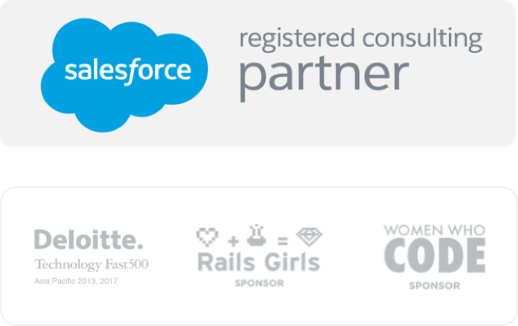
Before I get into answering the connection of Ruby on Rails, Heroku and Salesforce, let me begin by introducing reinteractive as a Salesforce partner. This means we build custom applications that seamlessly integrate with Salesforce CRM. We leverage our expertise in Ruby on Rails development and cloud platforms like Heroku to deliver these solutions. One of our core services is Salesforce integration.
Salesforce and Ruby on Rails occupy different spaces but can work together to create powerful business solutions. Here's the breakdown:
Salesforce:
- A cloud-based CRM (Customer Relationship Management) platform.
- Offers a pre-built CRM solution with features like contact management, lead nurturing, and sales pipeline tracking.
- Uses its own technology stack for development and maintenance.
Ruby on Rails:
- A web application framework used to build custom software applications.
- Offers a streamlined and efficient way to develop web applications.
Heroku Connect: Streamlining the Salesforce Connection
Heroku Connect, a popular add-on service on the Heroku platform, further simplifies the integration process between Salesforce and Ruby on Rails applications deployed on Heroku. It enables bi-directional data synchronization between your Heroku Postgres database and custom objects within your Salesforce org. This eliminates the need for manual data manipulation and ensures data consistency across both systems.
The Connection:
Ruby on Rails acts as a powerful bridge, extending the reach and functionality of Salesforce for businesses with specific needs. With Heroku Connect thrown into the mix, you get a streamlined and efficient development environment for building robust and scalable business solutions.
-
Integration:
Ruby on Rails shines in building custom applications that integrate with Salesforce.
These custom apps can:- Extend the functionality of the Salesforce CRM.
- Build additional features on top of Salesforce, specific to a company's needs.
- Connect Salesforce with other data sources or applications for a more unified system.
- Extend the functionality of the Salesforce CRM.
-
Custom AI Bot:
Build a custom generative AI bot that can converse with your customers, or any other imaginative use of AI to enhance your business
-
Data Flow:
Imagine a user viewing and updating their contact information captured in Salesforce in real time.
-
Flexibility:
Ruby on Rails provides the flexibility to build custom functionalities that might not be readily available within the core Salesforce offering. - Reporting Dashboard:
A Ruby on Rails app could create a custom reporting dashboard that pulls data from Salesforce and other sources for a more comprehensive view.
- E-commerce data and orders
An e-commerce platform built with Ruby on Rails could integrate with Salesforce to manage customer data and orders.
- Custom Mobile App
A custom mobile app for sales reps could be built with Ruby on Rails to access and update Salesforce data on the go.
- Faster Development:
Ruby on Rails is known for its rapid development capabilities, allowing companies to build custom integrations quicker.
- Cost-Effective:
Compared to building from scratch, using a framework like Ruby on Rails can streamline development and potentially reduce costs.
- Scalability:
Ruby on Rails applications can be scaled to accommodate growing data and user needs.
Examples of Integration:
Benefits of using Ruby on Rails with Salesforce:
In essence, Ruby on Rails acts as a powerful tool to extend the reach and functionality of Salesforce for businesses with specific needs.





